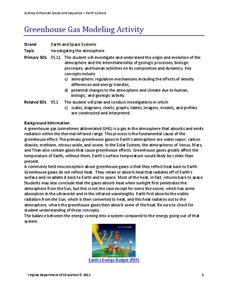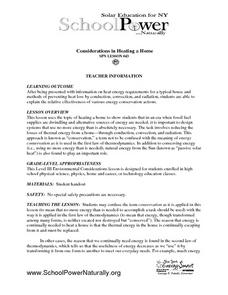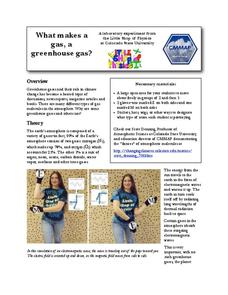Curated OER
Specific Heat and Insulation
Students measure the air and soil temperatures at designated times. They graph the temperatures of each on one piece of graph paper with different colors. Students compare the information for the two line plots and analyze their results...
Curated OER
Cold Fusion?
Students apply their knowledge of relativity and nuclear radiation to the concept of cold fusion. They also read the article from the website listed in the related and resource websites and discuss the article with the class.
Curated OER
Specific Heat and Insulation - Temperature Changes
Students expand their knowledge of how temperature changes between air and soil. They also examine how natural grass cover insulates the effects of the sun's direct radiation.
Curated OER
Please Ex-Planet
Seventh graders create a model of an earth centered solar system and a model of the sun centered solar system. As a class, they discuss why the earlier astronomers believed their model and why it changed when evidence arose that this...
Curated OER
Solar Storms
Students investigate the cycles of solar activity. They plot the solar activity and use the graph to answer a number of questions and explain the relationship between the solar storms and sunspots and the impact on earth and space travel.
National Wildlife Federation
I’ve Got the POWER! Solar Energy Potential at Your School
Should every school have solar panels? The 19th lesson in a series of 21 has scholars research the feasibility of using solar panels at their school. They begin by gathering data on the solar energy in the area before estimating the...
Curated OER
Is It Hot in the Light?
Third graders make observations about the temperature of items in direct sunlight. In groups, they discuss why asphalt, brick and cement are warmer than items surrounding them. To end the lesson, they examine how heat transfers energy...
Curated OER
Think GREEN - Utilizing Renewable Solar Energy
Students use data to find the best renewable energy potential. For this solar energy lesson students import data into Excel and explain how solar energy is beneficial.
Science Matters
Energy and Winds
In the study of wind energy, scholars build a small windmill and observe how it transfers wind into mechanical energy. Learners will make connections to the previous lesson plan with concepts such as the creation of wind...
Curated OER
Using Commas and Five Practice Exercises
In this using commas worksheet, students read about the proper use of commas. They also read about overuse and misuse of commas in their writing. They link to five practice exercise that are listed at the bottom of the page.
Curated OER
Cloudy vs. Clear
Students analyze line plots. For this weather lesson using real NASA data, students discuss how weather affects the way the Earth is heated by comparing different line plots.
American Association for the Advancement of Science
Sensing the Invisible: The Herschel Experiment
Learners of light will construct a contraption in which light is passed through a prism and shone into a box. The temperatures at different points along the path and outside of the path of light. The intent is to imitate William...
McAuliffe-Shepard Discovery Center
Global Warming in a Jar
This well-organized lab activity introduces earth science pupils to the greenhouse effect. They will set up two experiments to monitor temperatures in an open jar, a closed jar, and a closed jar containing water. Ideally, you would have...
Colorado State University
How Can I Turn a Solar Oven into a Refrigerator?
Whether you want to heat things up in science class or cool things down a bit, an intriguing lab's got you covered! Science scholars explore the principles of thermodynamics using a solar oven, then change the conditions to turn their...
Texas State Energy Conservation Office
Global Climate Change
Here is an extensive reading resource that addresses our climate change crisis. It thoroughly explains the greenhouse effect, related Earth cycles, and the history of climate change. Use it as part of the intended unit, published by the...
Virginia Department of Education
Greenhouse Gas Modeling Activity
Why are greenhouse gases called greenhouse gases? Young Earth scientists learn about greenhouse gases though experimentation in the second installment of a 3-part series. They use lamps to model radiant energy as well...
Curated OER
CO2 and You
Students study the scientific evidence about carbon dioxide emissions. They learn to calculate the amount of energy used by different appliances. They complete a worksheet which analyzes the amount of energy that their home uses.
Curated OER
Light
Here is a stellar slide show for illuminating middle schoolers' minds on the topic of light! An interactive slide allows viewers to sort light sources by whether or not they are man-made. More objects are displayed and learners discover...
Curated OER
Considerations in Heating a Home
Emerging engineers discover how important it is to conserve energy as fossil fuel supplies are being diminished. This is accomplished by working through a handout that explains energy requirements for heating a home during the winter....
Messenger Education
Snow Goggles and Limiting Sunlight
Why would someone need contact lenses that offer UV protection? With a 28-page packet full of instruction and worksheets, young scholars discuss solar radiation and its potential harm to eyes. They make snow goggles...
Colorado State University
What Makes a Gas, a Greenhouse Gas?—The Carbon Dioxide Dance
Investigate a heated topic in environmental science. Scholars team up to play the parts of gas molecules in the atmosphere. As the teacher moves about, acting as the electromagnetic wave, learners react as their molecules would to the...
Curated OER
Does Humidity Affect Cloud Formation?
Students use S'COOL data to identify factors that affect cloud formation. They find a data set using the S'COOL database , and use Excel to manipulate the data. Student isolate relevant data, create meaningful graphs from a spreadsheet,...
Curated OER
Incoming Solar Radiation
Demonstrate how the spherical shape of the Earth contributes to unequal heating of its surface and results in varying climates at different latitudes. This would be an illuminating addition to your meteorology lessons, especially when...
Space Awareness
Oceans as a Heat Reservoir
Oceans absorb half of the carbon dioxide and 80 percent of the greenhouse gases released into the atmosphere. Scholars learn how and why the oceans store heat more effectively than land and how they help mitigate global warming. Pupils...

























